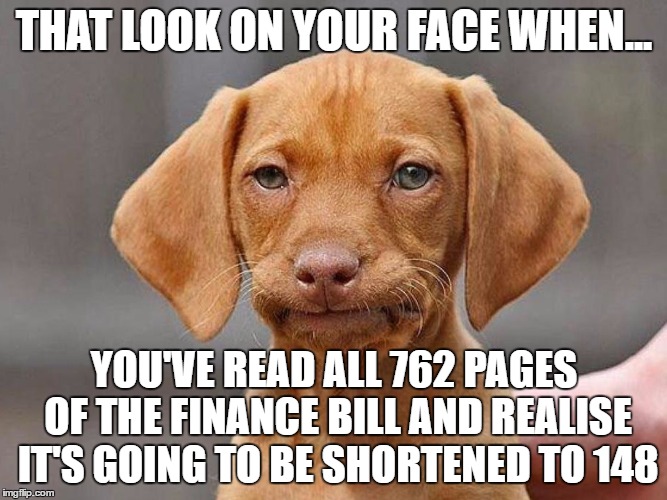
Taxpayers caught out by shortened 2017 Finance Act
A slim Finance Act 2017 was passed on 27th April, after shedding some 600 pages of tax proposals, some of which were due to take effect on either the 1st or 6th April. Therefore any taxpayers who have acted on the basis the new tax rules would apply may lose out.
Drastic cuts to Finance Act 2017
The largest Finance Bill in UK history was cut from 762 pages to 148 pages so that the opposition parties would agree to it being passed in the clear-up before Parliament was dissolved. This strategy worked as the Bill received Royal Assent on 27th April 2017 and became Finance Act 2017. However, it has left many taxpayers and accountants confused as to what happens to the tax reliefs and exemptions which hit the cutting room floor.
What has the Ammended Finance Bill Affected?
Pensions
An expanded tax exemption (from £150 to £500) for the cost of pension advice provided to employees and former employees was to apply from 6 April 2017. This advice may already have been given on the understanding it was tax free. But, as the tax exemption limit now remains at £150, employers need to be wary of breaching that limit, as a breach will incur a benefit in kind charge for employees. That’s unless of course this measure is reintroduced in a future Finance Bill, and backdated to 6 April 2017.
This change also means that the pensions regulations are now out of sync with tax law.
The Registered Pension Scheme allows for the pensions advice to be paid for by authorised withdrawals from a defined contribution pension plan. Up to three withdrawals of up to £500 per year may be made to pay for pensions advice.
Where an individual has already drawn taxable pension benefits from a defined contribution scheme, their subsequent pension contributions are capped by the Money Purchase Annual Allowance (MPAA). These taxpayers won’t know how much pension contributions they can make in 2017/18, as MPAA was set to reduce from £10,000 to £4,000 on 6 April 2017, but now won’t be.
Capital allowances
Businesses expected to claim 100% first year capital allowances on electric vehicle charging points installed from 23 November 2016 to 31 March 2019. These first-year allowances won’t be available, as the provision was removed before FA 2017 was passed.
Property and trading allowances
George Osborne announced two new allowances of £1,000 each in his 2016 Spring Budget, which would be available to be set against sundry income, and property income that doesn’t qualify for rent-a-room relief. These allowances were to apply from 6 April 2017, but they were removed from the Finance Bill 2017. Taxpayers therefore need to be careful to record all extra sources of income, however small.

George Osbourne leaves parliament at this election
Cash Basis
Individual landlords with an annual turnover of under £150,000 were to be obliged to use a cash basis for any income from 6th April 2017, rather than the accruals basis. So any landlords who have recorded transactions under the cash basis since 6 April 2017 will need to ensure the accruals basis is applied.
Company Shareholders
The rules for the substantial shareholdings exemption (SSE) were to be relaxed for transactions made on and after 1st April 2017, a move which was hailed by most accountants as a positive step. However, these measures were removed from the 2017 Finance Bill, which may catch out companies that already made share disposals on or after 1st April 2017 but before 27th April. A new tax relief for museums and galleries, who operate as companies, was to take effect for costs incurred on new exhibitions from 1 April 2017. Such organisations may have budgeted for exhibitions on the basis that the new tax relief would apply.
IR35 in public sector
The controversial measure to apply a version of the IR35 rules to off-payroll contracts performed in the public sector was retained in the Finance Bill, but it was amended at the last minute.
In the original draft of these rules would have applied to contracts performed for retail pharmacies, which had an NHS dispensing contract, as they were treated as being part of the public sector. As these businesses routinely use locum pharmacists, who often operate through personal service companies, this was a big issue. An amendment was made to the definition of public authority to exclude provision of pharmaceutical services and ophthalmic services for the NHS.
If you would like more detailed information on some aspect of UK Tax, send me an e-mail and I’ll be pleased to advise further.


 David Jones is the Senior Partner and Founder of Morgan Jones & Company. Born in Liverpool and an Accountancy graduate of the University of Wolverhampton, David spent twenty years working for the Customs & Excise in London then Shrewsbury before starting his own business. David's depth of knowledge of the UK tax system and his ability to communicate this learning has seen Morgan Jones & Company grow into Shropshire's most respected Accountancy Practice.
David Jones is the Senior Partner and Founder of Morgan Jones & Company. Born in Liverpool and an Accountancy graduate of the University of Wolverhampton, David spent twenty years working for the Customs & Excise in London then Shrewsbury before starting his own business. David's depth of knowledge of the UK tax system and his ability to communicate this learning has seen Morgan Jones & Company grow into Shropshire's most respected Accountancy Practice.